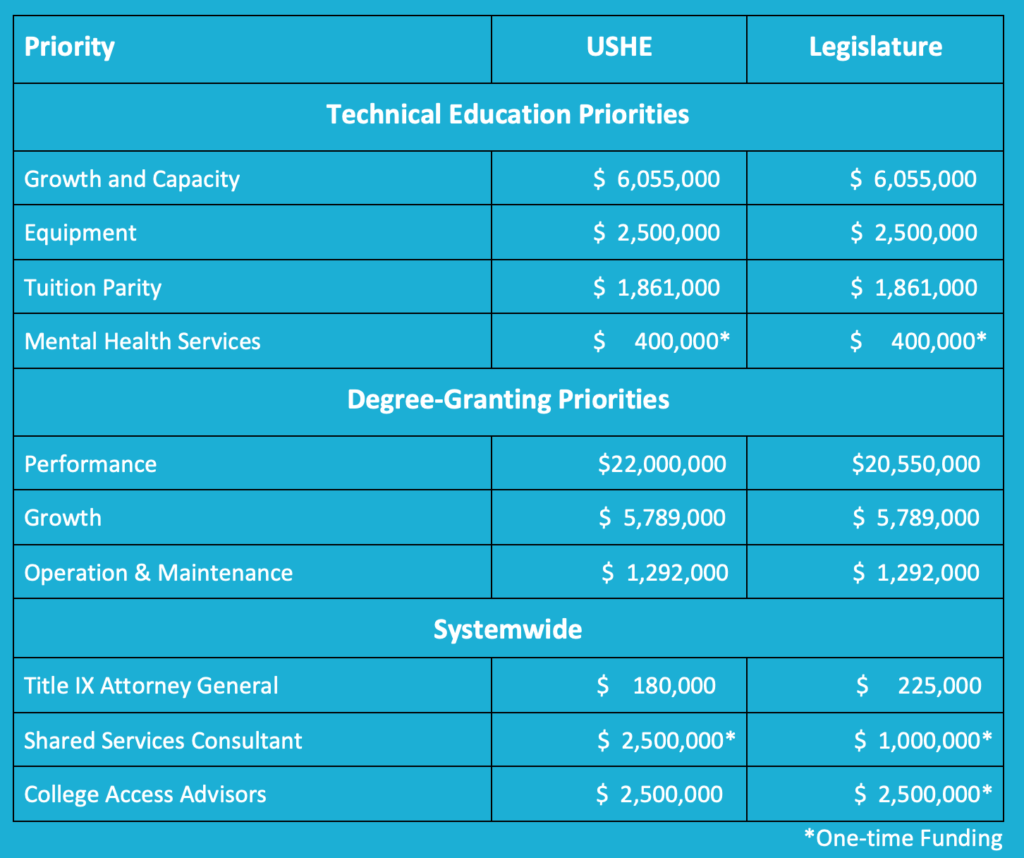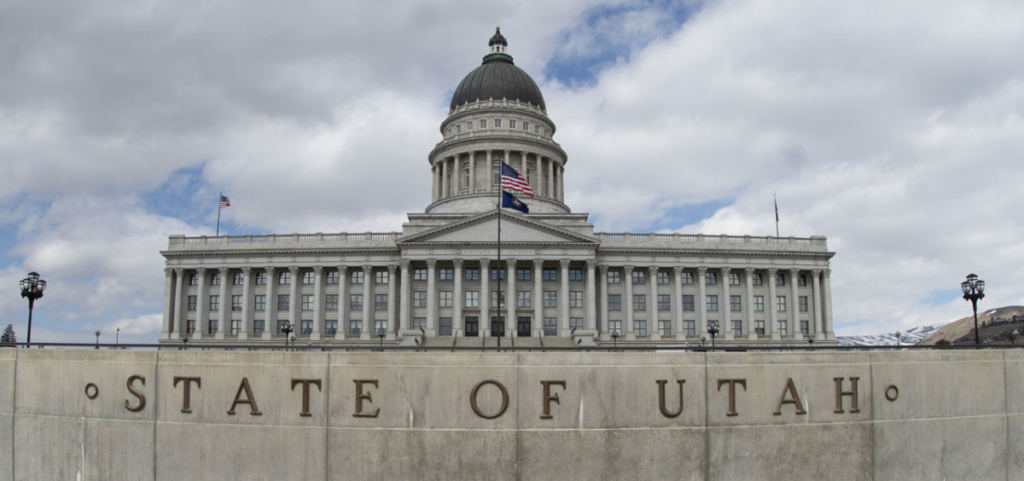March 1-5, 2021
The Legislature completed a most unique 2021 General Session late Friday night, approving one of the largest budget increases ever and adopting more than 500 pieces of legislation. This is a brief synopsis of the budget, capital development, and legislation pertaining to higher education adopted this session. A more exhaustive report will be presented to the Utah Board of Higher Education at its upcoming meeting on March 25-26.
Budget Summary
As noted last week, the Executive Appropriations Committee adopted new funding items, in addition to the base budget increases adopted early in the 2021 legislative session, which includes a 3% employee compensation market increase. The increases in funding to higher education are closely aligned to the budget priorities adopted by the Utah Board of Higher Education. The Board proposed a systemwide increase of 8.2% in ongoing funds. The Legislature appropriated the same percentage increase, albeit dispersed in other non-priority areas. However, such an increase in ongoing funds reflects the improved alignment of Board priorities with that of the Utah Legislature. The Legislature appropriated approximately $19 million in ongoing funds and $17 million in one-time funds for other items. Below is a summary comparison of Board priorities with what the Legislature funded.

Capital Development
As noted previously, all capital development priorities adopted by the Board were approved for funding. In the final appropriations bill (S.B. 3), the Legislature included intent language that will provide USHE with $120 million ongoing funding for capital projects in fiscal year 2023, if revenue projections come in as expected or higher. This ongoing funding will complete the capital model created in 2019 through S.B. 102, Higher Education Capital Facilities, by providing USHE institutions a portion of ongoing funding, allocated by formula, to plan and prioritize capital projects. This funding model replaces the traditional prioritization process used in the past by the then Board of Regents.
Legislation of Interest
SB 45, Higher Education Classes for Veterans by Rep. Weiler — allows veterans to audit classes at institutions of higher education tuition-free if the veterans are Utah residents.
HB 159, Higher Education Student Speech Rights by Rep. Jordan Teuscher — establishes a specific threshold that determines when student-on-student speech becomes harassment, as opposed to protected speech. Staff has worked with the legislative sponsor on a compromise that reduces legal liability to the institutions.
HB 233, Education Immunization Modifications by Rep. Mark Strong — prohibits USHE institutions from requiring proof of vaccination as a condition to enroll. It also prohibits institutions from requiring a vaccine-exempt student to participate remotely rather than in-person. The bill was amended to allow exceptions for students training in clinical health settings.
HB 278, Name Change Process for Dixie State University by Rep. Kelly Miles — establishes a process for the Dixies State University Board of Trustees and Utah Board of Higher Education to select and recommend a new name for the institution to the Legislature.
HB 279, Higher Education for Incarcerated Youth by Rep. Lowry Snow — establishes a virtually-delivered Concurrent Enrollment program and accompanying advisory program at Dixie State University for students in certain custody situations.
HB 318 (1st Sub), Higher Education Amendments by Rep. Melissa Ballard — clarifies and makes technical changes as required by SB 111 from the 2020 Legislative Session. It clarifies the roles of institutions and those of the Board of Higher Education, and it revises the Board’s priorities. The bill was substituted from its original, removing the proposed modifications to the process for presidential searches. The Utah Board of Higher Education endorsed this legislation.
HB 327, School for Civics and Economic Thought and Leadership by Rep. Jefferson Burton — establishes the School for Civics and Economic Thought and Leadership at Utah Valley University, seeking an ongoing appropriation of $2 million.
HB 328, Adult Learners Grant Program by Rep. Lowry Snow — establishes a scholarship program for students over 26 years old who demonstrate financial need and are enrolled in an entirely online certificate program in a field with industry need.
SB 107 (8th Sub.), In-Person Instruction Prioritization by Sen. Todd Weiler — requires an institution to provide at least 75% of the number of in-person courses that the institution offered at the beginning of the spring semester that began on or immediately after January 1, 2020, during corresponding semesters of the 2021-2022 academic year. Exceptions are allowed for nontraditional students who participate in online learning courses.
SB 136, Higher Education Scholarship Amendments by Rep. Derrin Owens — replaces the Regents’ Scholarship Program with the Opportunity Scholarship. It also extends opportunities for scholarships within technical education and forecloses new applications for the New Century Scholarship after this academic year. This legislation is in conjunction with the Board’s action in December 2020 to rename and simplify the state’s achievement-based scholarships. The Utah Board of Higher Education supports this legislation.
SB 141 (2nd Sub.), Task Force on Food Security by Sen. Luz Escamilla — creates the Task Force on Food Security (the task force) to develop a plan for establishing food security in the state. One of the task force members includes a Utah Board of Higher Education member.
SB 163 (3rd Sub.), Campus Safety Amendments by Sen. Jani Iwamoto — The bill clarifies reporting requirements of institution annual safety reports, along with additional requirements on how those reports are publicized. The adopted version omits the proposed student-led Safety and Equity Commission originally included in the bill.
SB 193 (2nd Sub), Higher Education Performance Funding by Sen. Ann Millner — modifies the current statute on performance funding by requiring the Board of Higher Education to establish five-year statewide goals in conjunction with 5-year goals the institutions set. State funding appropriations will be allocated to the institutions based on their performance in relation to these goals. The Utah Board of Higher Education supports this legislation.
SB 244 (1st Sub.), Student Religious Liberties Accommodations Amendments by Sen. Michael Kennedy — requires institutions of higher education to reasonably accommodate student absences from scheduled examinations or academic requirements if they create an undue hardship due to the student’s sincerely held religious beliefs. USHE institutions already have established policies allowing for such accommodations. This also requires the Board Secretary to annually publish information about the general procedure to request an accommodation.


